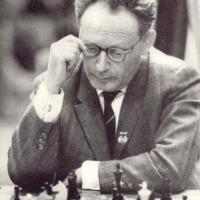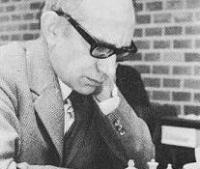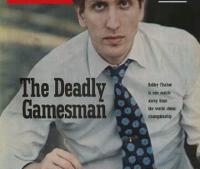
What are You Pretending?
Early Years
Mikhail Moiseyevich Botvinnik was born on August 17, 1911 in Kuokkola, near Saint Petersburg, to a Jewish family. His father was a dental technician and his mother, a dentist. He learned to play chess at the age of 12, practicing a lot and making rapid progress studying, reading the shajmaty listok of Chigorin, and openings books of Grekov.
Botvinnik's mother opposed his passion for chess and said: "what are you pretending? to be a Capablanca??" By a twist of fate, Botvinnik's first success, was beating the legendary Cuban in a 30-board simultaneous exhibition, which took place in Leningrad, on a free day of the Moscow International Tournament of 1925. Six months later, he won the Leningrad Championship semifinal with 11.5 of 12!
Soviet Champion and International Debut
He qualified for his first final tournament of the USSR Championships in 1927 as the youngest player at that time (only 16 years old), tied for fifth place and won the National Master title surpassing the norm by 2.5 points!
In 1931, at the age of 20, Botvinnik won his first Soviet Championship in Moscow, scoring 13½ out of 17. In late summer of that same year, he graduated with a degree in Electrical Engineering, after completing a practical assignment on temporary transmission lines at the Dnieper Hydroelectric Station. He stayed on at the Leningrad Polytechnic Institute to study for a Candidate's degree, in 1933; the year he repeated his Soviet Championship win, in his home city of Leningrad, with 14 out of 19.
His wife was an Armenian Russian named Gayane (Ganna) Davidovna, the daughter of his algebra and geometry teacher. She was a student at the Vaganova Academy of Russian Ballet in Leningrad and later, a ballerina in the Bolshoi Theatre. They had one daughter named Olga, born in 1941.
In his first tournament outside the USSR, Hastings 1934–35, Botvinnik achieved only a tie for 5th-6th places, with 5 out of 9. He wrote that in London after the tournament, Emanuel Lasker told him his arrival only two hours before the first round began was a serious mistake, and that he should have allowed ten days for acclimatization. Botvinnik wrote that he did not make this mistake again.
Botvinnik was shared first with Flohr, half a point ahead of Lasker and one point ahead of José Raúl Capablanca, in Moscow's second International Tournament, held in 1935. In Moscow 1936, Botvinnik finished second, one point behind Capa; in 1936, Botvinnik was invited to play in a tournament at Nottingham, England. Krylenko authorized his participation and, to help Botvinnik play at his best, allowed Botvinnik's wife to accompany him – a privilege rarely extended to chess players at any time in Soviet history. Taking Lasker's advice, Botvinnik arrived ten days before play started. Although his Soviet rivals forecast disaster for him, he scored an undefeated shared first place (+6 =8) with Capablanca, half a point ahead of current World Champion Max Euwe, Reuben Fine and Samuel Reshevsky, and 1 point ahead of ex-champion Alexander Alekhine.
Botvinnik won further Soviet Championship titles in 1939, 1944, 1945, and 1952, bringing his total to six – a record he shares with Mikhail Tal. In 1945 he dominated the tournament, scoring 15 out of 17; in 1952 he tied with Mark Taimanov and won the play-off match.
World Champion
Botvinnik won the 1948 World Championship tournament to replace the deceased Alekhine convincingly, with a score of 14 out of 20, three points clear, becoming the sixth World Champion.
Botvinnik then held the title, with two brief interruptions, for the next fifteen years, during which he played seven world championship matches. In 1951, he drew with David Bronstein over 24 games in Moscow, +5 =14 -5, keeping the world title, In 1954, he drew with Vasily Smyslov over 24 games at Moscow, +7 =10 -7, again retaining the title, In 1957, he lost to Smyslov by 9½–12½ in Moscow, but the rules then in force allowed him a rematch without having to go through the Candidates' Tournament, and in 1958 he won the rematch in Moscow. In 1960, Botvinnik was convincingly beaten 8½-12½ in Moscow by Tal, now 23 years old, but again exercised his right to a rematch in 1961, and won by 13–8 in Moscow. Finally, in 1963, he lost the title to Tigran Petrosian, by 9½-12½ in Moscow. FIDE had by then altered the rules, and he was not allowed a rematch.
Olympiad Career
Botvinnik was selected for the Soviet Olympiad team from 1954 to 1964 inclusively, and helped his team to gold medal finishes each of those six times. At Amsterdam 1954 he was on board one and won the gold medal with 8⅓ out of 11; then at home in Moscow 1956, he was again board one, and scored 9⅓ out of 13 for the bronze medal. In Munich 1958, he scored 9 out of 12 for the silver medal on board one. At Leipzig 1960, he played board two behind Mikhail Tal, having lost his title to Tal earlier that year; but he won gold medal on board two with 10⅓ out of 13. He was back on board one for Varna 1962, scoring 8 out of 12, but failed to win a medal for the only time in his Olympiad career. His final Olympiad was Tel Aviv 1964, where he won the bronze with 9 out of 12, playing board 2 as he had lost his title to Petrosian. Overall, in six Olympiads, he scored 54½ out of 73 for an outstanding 74.6 percent.
Botvinnik had another professional specialization as an electrical engineer and later a PhD, but it was on chess that he spent most of his life.
Some of the books that really helped my own personal progress in chess were "Selected Games of Botvinnik."






